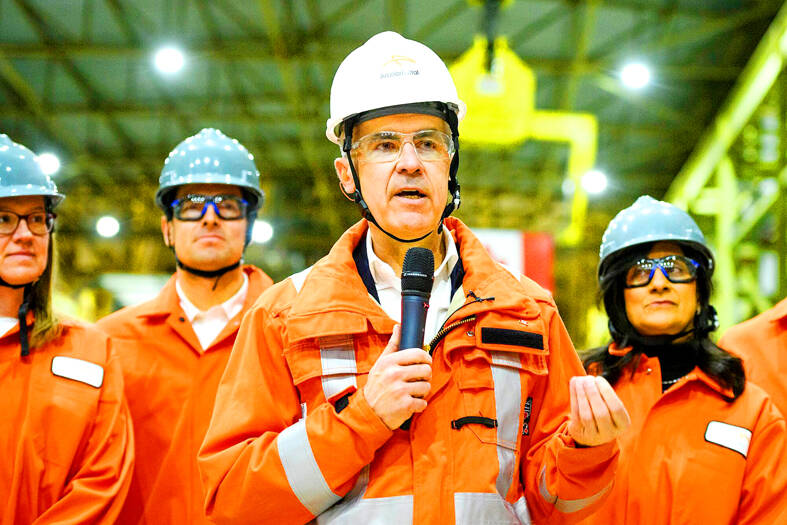Major trade partners swiftly hit back at US President Donald Trump’s increased tariffs on aluminum and steel imports, imposing stiff new taxes on US products from textiles and water heaters to beef and bourbon.
Canada, the largest supplier of steel and aluminum to the US, on Wednesday said that it would place 25 percent reciprocal tariffs on steel products and also raise taxes on a host of items: tools, computers and servers, display monitors, sports equipment and cast-iron products.
Across the Atlantic, the EU said it would raise tariffs on US beef, poultry, bourbon, motorcycles, peanut butter and jeans.

Photo: Bloomberg
Combined, the new tariffs would cost companies billions of dollars, and further escalate the uncertainty in two of the world’s major trade partnerships. Companies would either take the losses and earn fewer profits, or more likely pass costs along to consumers in the form of higher prices.
Prices would go up, in Europe and the US, and jobs are at stake, European Commission President Ursula von der Leyen said.
“We deeply regret this measure. Tariffs are taxes. They are bad for business, and even worse for consumers,” Von der Leyen said.
The EU duties aim for pressure points in the US while minimizing additional damage to Europe.
EU officials have made clear that the tariffs — taxes on imports — are aimed at products made in Republican Party-held states, such as beef and poultry from Kansas and Nebraska, and wood products from Alabama and Georgia.
The tariffs would also hit blue states such as Illinois, the No. 1 US producer of soybeans, which are also on the list.
Spirits producers have become collateral damage in the dispute over steel and aluminum.
The EU move “is deeply disappointing and will severely undercut the successful efforts to rebuild US spirits exports in EU countries,” Distilled Spirits Council president Chris Swonger said.
The EU is a major destination for US whiskey, with exports surging 60 percent in the past three years after an earlier set of tariffs was suspended.
Incoming Canadian prime minister Mark Carney on Wednesday said he is ready to meet with Trump if he shows “respect for Canadian sovereignty” and is willing to take “a common approach, a much more comprehensive approach for trade.”
Carney, who is to be sworn in in the coming days, said workers in both countries would be better off when “the greatest economic and security partnership in the world is renewed, relaunched. That is possible.”
Trump slapped similar tariffs on EU steel and aluminum during his first term in office, which enraged European and other allies.
The EU also imposed countermeasures in retaliation at the time, raising tariffs on US-made motorcycles, bourbon, peanut butter and jeans, among other items.
This time, the EU action would involve two steps. First on April 1, the commission would reimpose taxes that were in effect from 2018 and 2020, but which were suspended during former US president Joe Biden’s administration. Then on April 13 come the additional duties targeting 18 billion euros (US$19.6 billion) in US exports to the bloc.
EU Commissioner for Trade and Economic Security Maros Sefcovic traveled to Washington last month in an effort to head off the tariffs, meeting with US Secretary of Commerce Howard Lutnick and other top trade officials.
He said on Wednesday that it became clear during the trip “that the EU is not the problem.”
“I argued to avoid the unnecessary burden of measures and countermeasures, but you need a partner for that. You need both hands to clap,” Sefcovic told reporters at the European Parliament in Strasbourg, France.
Canada is imposing 25 percent reciprocal tariffs on steel products worth C$12.6 billion (US$8.8 billion) and aluminum products worth C$3 billion as well as additional imported US goods worth C$14.2 billion for a total of C$29.8 billion.
The list of additional products affected by counter-tariffs includes tools, computers and servers, display monitors, water heaters, sport equipment and cast-iron products.
These tariffs are in addition to Canada’s 25 percent counter tariffs on C$30 billion worth of imports from the US that were put in place on Tuesday last week in response to other Trump tariffs that he has delayed by a month.

‘EYE FOR AN EYE’: Two of the men were shot by a male relative of the victims, whose families turned down the opportunity to offer them amnesty, the Supreme Court said Four men were yesterday publicly executed in Afghanistan, the Supreme Court said, the highest number of executions to be carried out in one day since the Taliban’s return to power. The executions in three separate provinces brought to 10 the number of men publicly put to death since 2021, according to an Agence France-Presse tally. Public executions were common during the Taliban’s first rule from 1996 to 2001, with most of them carried out publicly in sports stadiums. Two men were shot around six or seven times by a male relative of the victims in front of spectators in Qala-i-Naw, the center

Canadian Prime Minister Mark Carney is leaning into his banking background as his country fights a trade war with the US, but his financial ties have also made him a target for conspiracy theories. Incorporating tropes familiar to followers of the far-right QAnon movement, conspiratorial social media posts about the Liberal leader have surged ahead of the country’s April 28 election. Posts range from false claims he recited a “satanic chant” at a campaign event to artificial intelligence (AI)-generated images of him in a pool with convicted sex offender Jeffrey Epstein. “He’s the ideal person to be targeted here, for sure, due to

DISPUTE: Beijing seeks global support against Trump’s tariffs, but many governments remain hesitant to align, including India, ASEAN countries and Australia China is reaching out to other nations as the US layers on more tariffs, in what appears to be an attempt by Beijing to form a united front to compel Washington to retreat. Days into the effort, it is meeting only partial success from countries unwilling to ally with the main target of US President Donald Trump’s trade war. Facing the cratering of global markets, Trump on Wednesday backed off his tariffs on most nations for 90 days, saying countries were lining up to negotiate more favorable conditions. China has refused to seek talks, saying the US was insincere and that it

Australia’s opposition party yesterday withdrew election promises to prevent public servants from working from home and to slash more than one in five federal public-sector jobs. Opposition leader Peter Dutton announced his conservative Liberal Party had dropped its pledge that public servants would be required to work in their offices five days a week except in exceptional circumstances. “I think we made a mistake in relation to this policy,” Dutton told Nine Network television. “I think it’s important that we say that and recognize it, and our intention was to make sure that where taxpayers are working hard and their money is